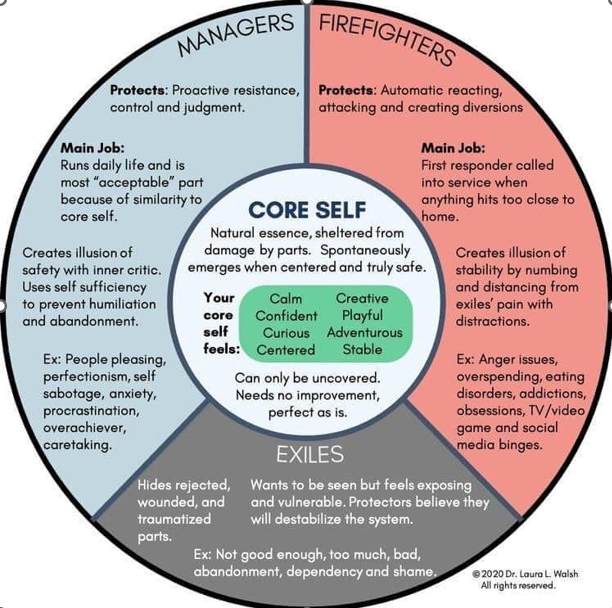What Is IFS, and Do I Really Have Parts?
My first introduction to Internal Family Systems Therapy several years ago was through reading the book by Janina Fisher, Healing the Fragmented Selves of Trauma Survivors. What most caught my attention was when Fisher described outwardly destructive behaviors- such as eating disorders, suicidal ideation, and self-harm- as “parts” that were attempting to help by relieving overwhelming emotional pain. Could this be true? Was a completely different approach with my clients warranted? Rather than focusing on obliterating maladaptive behaviors, should I rather be appreciating their attempts to help the client survive and exploring the pain behind them? Thus began my journey into IFS and exploring my own world of parts.
Internal Family Systems therapy focuses on the relationship between various parts of ourselves that make up our internal “system.” As in family systems, different members might ally with one another while others are “polarized” or at odds. IFS breaks down these members into 3 categories: Self, protectors (firefighters and managers) and exiles.
Self is the core of who we are, and when we are living from this center, we will naturally display positive qualities such as compassion, curiosity, confidence, courage, clarity, calm, creativity, and connectedness (yes, there are 8 C words 😊). Christians can think of living in Self as being connected to the Spirit of God and displaying the fruit of the Spirit (Galatians 5:22-23) which parallel the 8 C’s.
However, other parts of us disrupt the Self’s leadership when they become burdened by trauma, disappointment, hurts, and the stress of living in this chaotic world. Exiled parts are often very young “inner child” places in our hearts that carry deep emotion and pain. In an attempt to protect these vulnerable parts from being triggered and their (seemingly) intolerable emotion coming to the surface, protectors come in to save the day.
Managers are the more “socially acceptable” protectors that often run our day-to-day lives, such as people-pleasers, performers, critics, taskmasters, caregivers, controllers, or even “spiritualizers”. These parts believe that if they keep us in line or keep others happy, then we will not be hurt again or feel the pain of the buried exiled parts. However, they can absolutely wear us out in the process! When operating from a manager part, we are not living from Self and will be lacking in those C qualities, unable to connect with others or feel at peace within ourselves. For example, I have a very dominant productive manager part that believes I should be busy accomplishing things all the time, so I do not get behind and miss deadlines or fail to complete something important (good intentions). When burdened, though, that manager will prevent me from having fun and being able to rest, which are vital aspects of a balanced life.
Firefighters are often the parts that bring clients to my office, and they tend to be disliked by many for the problems they create. These are the reactive parts that come to the rescue when a person experiences overwhelming pain or unpleasant emotion, often connected to buried exiled parts. We know these parts by their extreme behaviors: binge eating, alcoholism, raging, drug addiction, compulsive shopping, endless Netflix watching, dissociation, self-harm, or suicidal thoughts/attempts. These parts can be HARD to appreciate and are often despised by the manager parts, who attempt to control them. Yet, their positive intent is to help a hurting individual cope with pain that seems unbearable.
How does one live from Self and not be hijacked by well-meaning but problematic protective parts? As most of you have probably already discovered, trying to “get rid of” managers or firefighters is typically unproductive and often makes those parts dig in their heels even more. There is a reason for this: those parts do not believe you are safe without them until the hurting exiles they protect are healed. Nurturing, caring for, and healing those wounded child parts is essential for an integrated internal system. Once those protector parts believe they no longer need to to protect the deeply vulnerable parts of you, they can relax and take on new, unburdened (and less disruptive!) roles: perhaps being a wise adviser, a fun-loving spontaneous part, or a brave adventurer.
We will always have parts, but when healed, those parts simply display various aspects of our personalities and specific roles we play (like my mom part and therapist part 😊) without disconnecting us from Self. The goal in IFS therapy is to be Self-led and for parts to be unburdened so that we can experience internal harmony. As I have watched this process unfold with my clients, I have been amazed at how quickly we have been able to address deep trauma and root issues by trusting the internal system and listening to the client’s parts. The “trailheads” (as IFS refers to them) of anything from an undesirable behavior, intense emotion, or even a sensation/symptom in the body, lead us to what needs to be healed.
If you would like to learn more about your parts and IFS, I recommend No Bad Parts or Greater Than the Sum of Your Parts by IFS founder Richard Schwartz. For a Christian perspective on IFS, both Allison Cook’s Boundaries for Your Soul and Jenna Riemersma’s Altogether You are excellent resources. If you would like to work with an IFS therapist, visit the IFS Institute’s directory: https://ifs-institute.com/practitioners or Jenna Riemersma’s Christian IFS therapist listing: https://jennariemersma.com/find-christian-ifs-therapist.
Pamela is an IFS therapist who has completed Level 1 training through the IFS Institute. She has additional training in Christian integration of IFS and treating medical syndromes with IFS.

